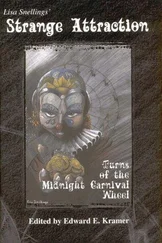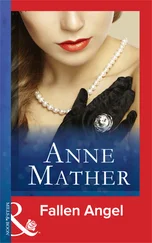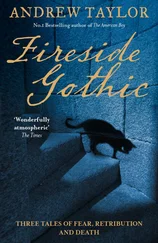‘I’d like a word with my husband, if you please.’
Eddie called Mr Reynolds and went back into the kitchen, closing the door behind him with relief. Sometimes, when he was washing up in the winter months, he looked through the kitchen window, through the screen of leafless branches, and glimpsed Mrs Reynolds with her binoculars on the balcony of the flat. Mr Reynolds had told Angel at great length about how he had bought a new and more powerful pair of binoculars as a surprise birthday present for his wife.
There was a tap on the kitchen door. Mr Reynolds edged into the room.
‘Sorry – something’s come up. I’ll have to go now. I’ll give you a ring in the morning, if that’s OK?’ He looked perfectly normal. It wasn’t what he said but how he said it. His voice trembled, and his breathing was irregular. He sounded ten years older than he really was.
Eddie stood up. ‘Is everything all right?’ He knew that Angel would want to know why Mr Reynolds had left early.
‘It’s our Jenny,’ said Mr Reynolds, retreating backwards out of the room as if withdrawing from royalty. ‘There’s been an accident.’
Poor Jenny Wren. Who better than Eddie to know that patterns repeated themselves? Sometimes he thought of his father and wondered what had happened to him when he was young; and so on with his father’s father and his father’s father’s father; and back the line went through the centuries, opening a vertiginous prospect stretching to the birth of mankind.
Even as a child, Jenny Wren had been marked out as a failure. Fat, clumsy and desperate for love, she carried her self-consciousness around with her like a heavy suitcase handcuffed to her wrist. Her children, Eddie learned later from Mr Reynolds, had been taken into care. And after the third one was born, Jenny Wren plunged into a post-natal depression from which she never really emerged.
She lived in Hackney, in a council flat on the fourth floor of a tower block. On that morning when her father was putting the finishing touches to Angel’s fitted wardrobes, she took a basket of washing on to her balcony. Instead of hanging out the clothes, however, she leant over the waist-high wall and stared down at the ground. Then – according to a witness who was watching, powerless to intervene, from a window in the neighbouring block – she lifted first one leg and then the other off the ground and rolled clumsily over the wall.
Characteristically, the suicide attempt was a failure. Though she dived head first on top of her cerebral hemispheres, the fall was partly broken by a shrub. She did a good deal of damage to herself – a badly fractured skull and other broken bones – but unfortunately she survived. A week after the fall, Mr Reynolds returned to 29 Rosington Road to finish off the wardrobes.
‘Jen’s in a coma. May never wake up. If she does, there may be brain damage.’
Angel patted his hand and said how very, very sorry they were. She and Eddie had sent flowers to the hospital.
‘How’s Mrs Reynolds coping?’
‘Not easy for her. The chaplain’s been very kind.’ The shock had made Mr Reynolds less talkative, and everything he said had a staccato delivery. ‘Not that we’re churchgoers, of course. Time and a place for everything.’
‘Are you sure you want to carry on with the wardrobes?’ Angel asked. ‘I’m sure we could find someone else to finish off. You must have so much to do. We’d quite understand.’
‘I’d rather keep busy, thanks all the same.’
Halfway through June, about six weeks after Jenny Wren’s fall, the first little girl came to stay at 29 Rosington Road.
Chantal was the daughter of an English investment analyst and his French wife. The family lived in Knightsbridge, a long stone’s throw from Harrods. Chantal was the third child and her parents did not pay her much attention, preferring to hire nannies and au pairs to provide it instead. Angel had first noticed her at a birthday party for one of Chantal’s school friends; at the time, Angel had been acting as a relief nanny for the school friend’s younger sister.
Despite frequent temptation, Angel never took one of her own charges. ‘Only stupid people run unnecessary risks,’ she told Eddie when they were preparing the basement for Chantal. ‘And they’re the ones who get caught.’
Chantal’s father was black and she had inherited his pigmentation. (Angel despised people like Thelma who were racist.) They dressed her in white dresses, which set off her rich dark skin. She had a tendency to giggle when Eddie played games with her. Occasionally Angel acted – in Eddie’s phrase – as Mistress of Ceremonies. But he did not think she enjoyed the games very much.
Human beings were such a mass of contradictions. Although Angel was wonderful at looking after children, and skilled at making them do as she wanted, she seemed not to like playing with them.
Eddie had a wonderful time for two weeks and three days. One morning he woke to find Angel beside his bed. She was carrying a cup of tea for him, a rare treat. He sat up and thanked her, his mind already running ahead to the treats planned for the day.
‘Eddie.’ Angel stood by the bed, adjusting the knot that secured her robe. ‘Chantal’s gone.’
‘Where? What happened?’
‘Nothing’s wrong, don’t worry. But I took her back home last night. Back to her mummy and daddy.’
He stared at her. ‘Why didn’t you tell me?’
‘Because I knew you’d be upset. I knew you’d hate having to say goodbye to her.’ She paused. ‘And she wouldn’t want to leave you.’
Eddie felt his eyes filling with tears. ‘She could have stayed with us.’
‘No, she couldn’t. Not for ever and ever. There would have been all sorts of difficulties as she grew older.’
Eddie turned his face towards the wall and said nothing.
‘Think about it.’
Eddie sniffed. Then a new problem occurred to him. ‘What happens if she tells her parents about us, and they tell the police?’
‘What can she say? All she’s seen is our faces. She doesn’t know where the house is, or what the outside looks like. She only saw the basement. Besides, the police aren’t going to try too hard. Chantal’s back home, safe and sound. No harm done, is there?’
‘I still wish I could have said goodbye.’
‘It made sense to do it this way. We didn’t want tears before bedtime, did we?’
‘Maybe she could come and stay with us again?’
Angel sat down on the edge of the bed. ‘No. That wouldn’t be a good idea. But perhaps we can find someone else to come and stay.’
‘Who?’
‘I don’t know yet. But no one who lives in Knightsbridge. The police look for patterns, you see. They try to pinpoint the recurring features.’
For Katy, they travelled up to Nottingham and rented a flat there for three months. Katy was an unwanted child who escaped from her foster parents at every opportunity and wandered the streets and in and out of shops.
‘Looking for love,’ Angel commented. ‘It’s so terribly sad.’
Suki, their third little girl, had a stud in her nose and a crucifix dangling from one ear; she belonged to some travellers camping in the Forest of Dean. Angel said that the mother was a drug addict; certainly Suki smelled terribly, and when they washed her for the first time the bath water turned almost black. (This was the occasion when Suki bit Eddie’s hand and screamed like a train.)
‘Some parents shouldn’t be trusted with children,’ Angel used to say. ‘They need to be taught a lesson.’
She repeated this so often, in so many ways and with such force, that Eddie thought it might amount to part of a pattern, albeit one invisible to the police.
On Sunday the first of December, after Lucy’s bath, Angel spent the rest of the morning reading to her in the basement. At least, that was what Angel said she was doing. Eddie was both hurt and angry. Angel had never been possessive with the others: she and Eddie had shared the fun.
Читать дальше












